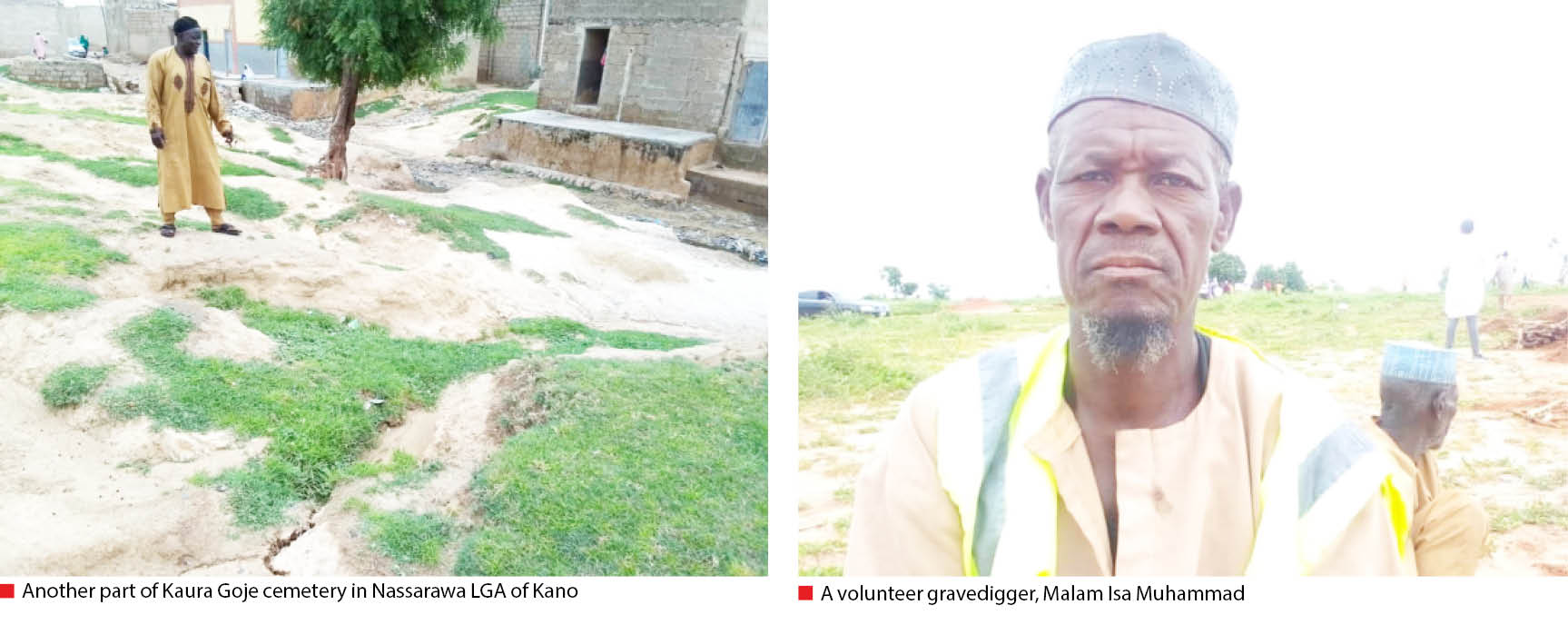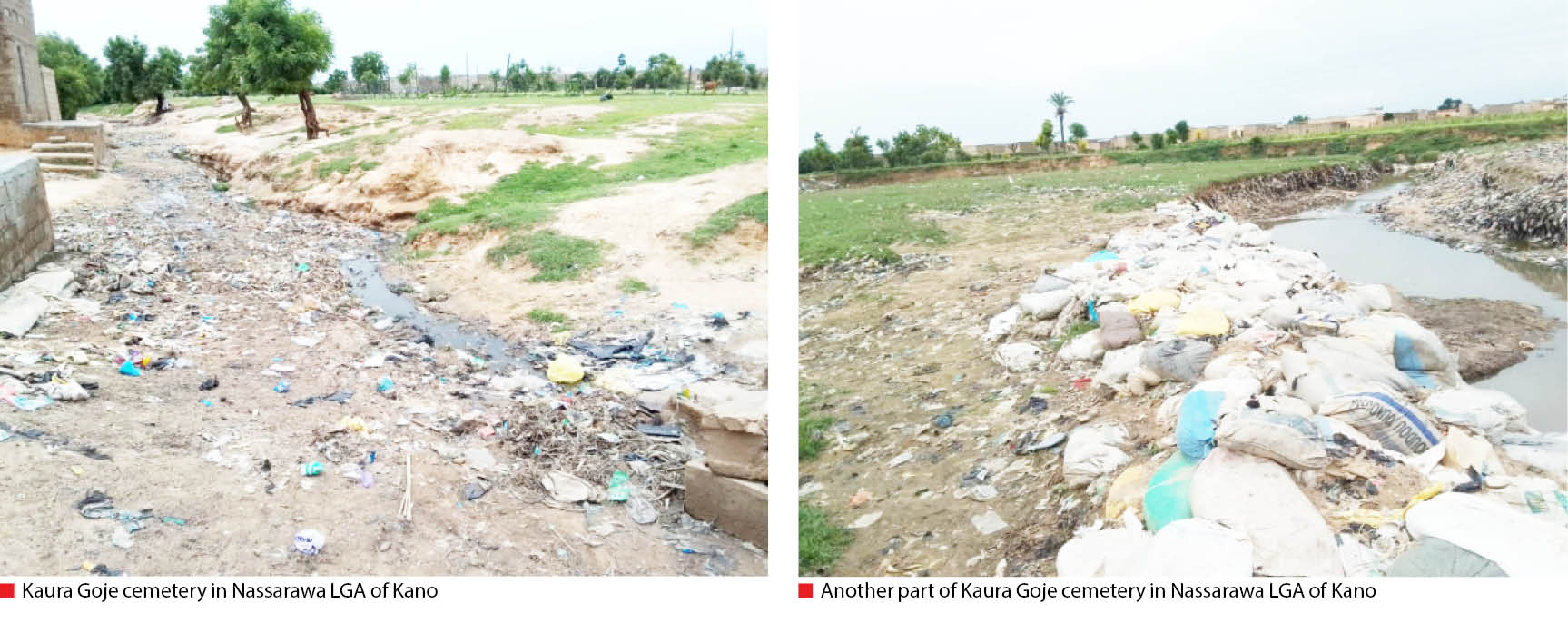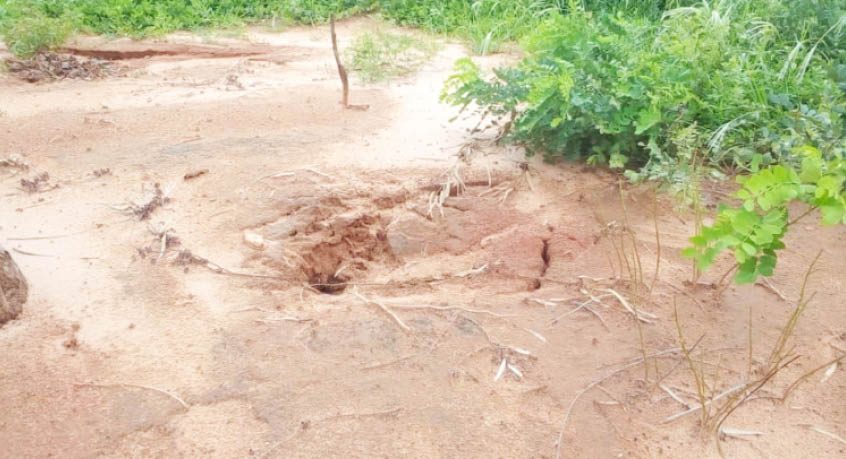Cemeteries in most states in the North suffer poor maintenance which often expose them to challenges of flooding, among others. This piece examines the state of major cemeteries in some northern states in the country and issues around them.
Lubabatu I. Garba (Kano), Habibu Idris Gimba (Damaturu), Haruna Gimba Yaya (Gombe) & Abubakar Akote (Minna)
Kano graveyards overtaken by flood
Residents of Kaura Goje in Nasarawa Local Government Area of Kano State said that the heavy rains this rainy season have continued to cause flooding which they say exhume remains of corpses buried in their cemetery.
Akwa Ibom augments FG’s palliatives, begins distribution Monday
FG tasks women farmers on economic devt, food security
Our correspondent gathered that apart from the Kaura Goje cemetery, some other cemeteries in the ancient city of Kano like Dantsinke and Getsi were equally affected.
The residents said incidents of flood washing up dead bodies were not new in the town.
Some residents of Kaura Goje claimed that human skeletons, as well as fresh corpses, had been washed out of their graves by the flood and erosion in the area.
Malam Nasiru Abdullahi is the chairman of the community’s committee of Kaura Goje cemeteries. He said, “In Kaura Goje, we have three cemeteries which comprises Kaura Goje, Filin Alkama and that of Layin Kwalabe. Whenever there is heavy rainfall, dead bodies would be washed out and seen floating in the burial ground. In Filin Alkama, about four new corpses have disappeared.”
According to the state’s Graveyard Standing Committee, hundreds of graves in urban and rural cemeteries within the state are in deplorable condition and need urgent attention.
The committee’s Public Relation Officer, Yusuf Tukur, said the heavy rain ripped open cemeteries at Dan Hassan in Kura local council; Rimin Kebbe, Fako and others in Gwale.
Tukur said, “At Dan Hassan, in Kura Local Government Area, the graveyard is in a deplorable condition; it has been flooded with water and the graves are collapsing on a daily basis.
“Already, many graves, where we visited and assessed, have collapsed. At the same time, we visited another graveyard in Nassarawa Local Government Area where the people turned the graveyard into a dump for refuse, as well as a grazing field for cows and donkeys.

“Insecurity in our graveyards is very disturbing, as people with criminal intents have converted graveyards to hiding places since they are aware that nobody will dare chase them to the graveyards.”
He said they have written a memo to the state government on the issue, urging the government to do the needful before things get out of hand.
“On the insecurity issue, we’ve called on the government to employ more security guards and put them on government payroll with permanent and pensionable status, not as casual staff,” he added.
He also called on philanthropists in the state to come in by providing sand that can be used as embankment for the affected grave yards.
“We are appealing to philanthropists to provide these cemeteries with sand which can be used in filling up the graves. We also call on good Samaritans in the state to come out to do the work,” he appealed.
Yobe cemeteries suffer poor maintenance
Cemeteries in Potiskum and Damaturu local government areas of Yobe State suffer from poor maintenance and handling which often expose them to challenges of flooding.
Daily Trust Saturday observed that some of these cemeteries are being threatened by flooding and erosion.
The state of the graveyard in Potiskum town behind the General Hospital is in a state of disrepair and needs sand to rehabilitate it as the flood has completely taken over the yard. However, several announcements were made in the mosques for people to come out for community service in response to the call.
Although it took them over two weeks to work there, the calls for providing sticks and sand have been intensified by relevant stakeholders.
“Government and wealthy individuals should help us with sand so that we can work on the graveyard so that it will not be submerged like other graveyards,” says Adamu Yawale, one of the security guards at the cemetery behind the general hospital in Potiskum LGA.
Our correspondent gathered that the security guards in most of the cemeteries in Yobe State are not on government’s payroll. They are paid from gifts from wealthy individuals, which is why they are urging government to employ them.

“We don’t receive salary here; we just collect gifts or Zakat from wealthy individuals when they come here. So, we are calling on the government to come to our aid by employing us so that we can do our jobs efficiently,” he added.
The story is not different from other graveyards in Potiskum as residents have continued to express concerns over the deplorable conditions of the graveyards located in the town, especially during the rainy season.
In the recent rainfall that affected houses and farmlands, the graveyards suffered from erosion and collapse which prompted some community members to donate truckloads of laterite soil to fortify some of the exposed graves after numerous calls by relevant stakeholders.
Suleiman Saidu, a security guard at Late Mamman B. Ali graveyard, told Daily Trust Saturday that the lack of waterways in the place will continue hurting the graveyard, and expose some corpses unless drainage is constructed.
“In the entire graveyard, we don’t have waterways hence making it inaccessible during the rainy season. The graveyard is submerged annually. No matter how you repair or rehabilitate it, it will still collapse because of lack of drainage. Heavy downpours have been washing away many graves, which expose corpses, due to this obvious reason,” he said.
“So, what we want now is for government and concerned individuals to construct drainage or waterways in this graveyard so that whenever there’s heavy downpour, the drainage will take care of stagnant water,” he added.
When our correspondent visited some graveyards in Damaturu city, he observed similar issues with Potiskum graveyards although the Potiskum’s challenges are more severe.
Overrun by grasses in Gombe
The Gombe Central Graveyard is located some three kilometres from the metropolis.
The walled cemetery, which occupies over 50 hectares of land, located northeast of Gombe metropolis, has been serving as the final ‘resting place’ for the people of Gombe and environs since the early 2008, after the old burial ground was filled to capacity.
Our correspondent observed that most of the graves are usually covered by grasses during the rainy season. And grasses are usually cleared to dig a new grave whenever a fresh corpse is brought to the cemetery.
Daily Trust Saturday learnt that there are volunteers who usually clear the grasses and do other maintenance work, especially during the rainy season, but for some time now, they have not come; hence grasses have grown over the graves.
It was also gathered that corpses are buried at the cemetery from early morning till late in the evening; and there’s no pre-condition before people bury their relatives.
“Most of the corpses are brought in very late in the evening, so they have to provide proof, mostly from hospitals, that there is nothing fishy about them,” one of the gravediggers at the cemetery said.
He added that another challenge is that of erosion and flooding, especially during the rainy season, which at times submerge freshly dug graves.
A volunteer gravedigger, Malam Shehu Hussaini, said clearing the existing drainages and construction of new ones will help to ease the issue of submerging graves at the cemetery.
He added that there is also the issue of erosion, which is also affecting the graveyards.

“There is erosion at the eastern part of the cemetery, where a large area of the graveyard has already become a big valley. We fear that it may gradually encroach and affect the other areas,” he complained.
Another staff member who spent 16 years working at the graveyard, Malam Isa Muhammad, said they are not facing security threats because the cemetery is fenced from all sides.
The 63-year-old man said they’ve never recorded any incidence of grave raiding by men of the underworld, or any incidence that may affect the cemetery.
He added that, “The only problem we are facing is that of submerging graves during the rainy season. The drainages need to be cleared and new ones constructed to prevent such incidents.”
According to Malam Muhammad, some months ago, the Senior District Head of Gombe, late Alhaji Abdulkadir Abubakar Umar (Yariman Gombe), provided gravels that they are using to fix submerged graves.
It was observed that the gravediggers, most of whom work voluntarily at the cemetery, depend largely on handouts mostly from members of the public for their upkeep.
Another volunteer, 50-year-old Malam Usman Abubakar, has been working for over five years without salary.
According to him, he opted to work at the graveyard as a means of getting rewards.
“I was a subsistence farmer, but what I cultivated could not even feed my family, not to talk of selling some. I also sold grasses,” he said.
According to him, as a volunteer he is not finding the job easy. “I rely on what people give us as alms when we dig graves for them or offer assistance to bury the corpses they bring to the graveyard.
“But to be candid, I am just struggling to feed my family, and at the age of 52, I cannot do hard labour,” he said.
Niger
In Niger State, the Unguwan-Daji Graveyard, one of the major Muslim cemeteries in Minna, is in dire need of proper drainage system to save graves from being washed away.
Residents said during the rainy season, maintenance of the yard is very challenging due to water that passes through it from the mountains that surround it.
One of the residents, Adams Muhammad, said “You see blood gushing out of the new graves as buried corpses begin to decompose. It is not supposed to be so. The graveyard needs good drainage system, and the authorities should do something.”
Another resident, Mallam Muhammad Sadiq, told Daily Trust Saturday that “As I speak with you, many new graves are at the risk of being washed away. If you go inside the cemetary now, you will see blood gushing out of new graves because of water that passed through the graveyard. The place is a river. So, when corpses are laid to rest, graves get filled up with water. But the reason why blood gushes out is because of lack of drainage system in the graveyard. Authorities need to take action to divert the water that flows down from the mountains. Though the people maintaining the graveyard are doing their best but they need support to construct good drainages.”
Our correspondent gathered that the Emir of Minna, Alhaji Umar Farouk Bahago, and some good Samaritans have made series of interventions to address the challenge but it has remained unabated due to the severity of water that flows from mountains that surround the graveyard each time rain falls.
Residents say they were concerned about the possible outbreak of diseases, especially the blood being washed out of the new graves by water.

 Join Daily Trust WhatsApp Community For Quick Access To News and Happenings Around You.
Join Daily Trust WhatsApp Community For Quick Access To News and Happenings Around You.


